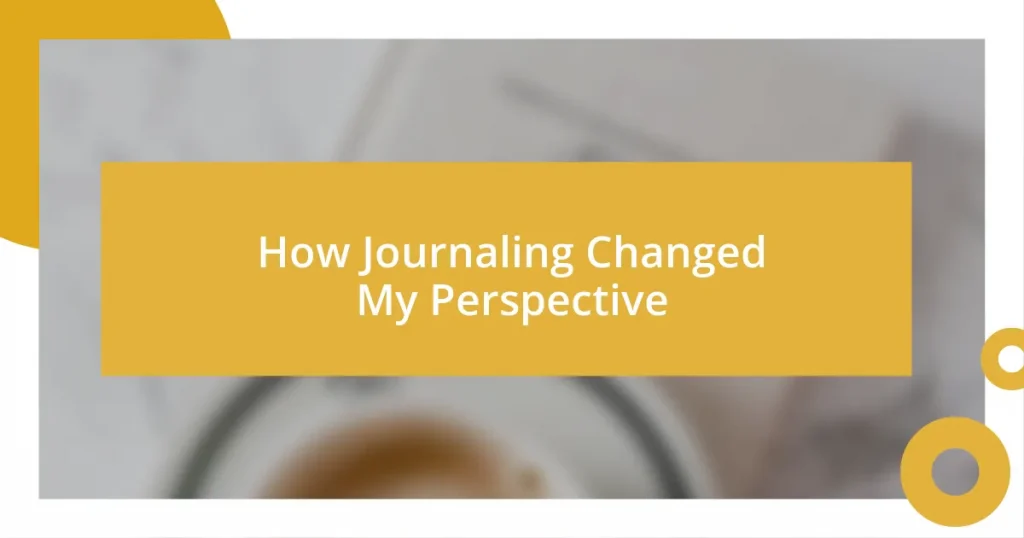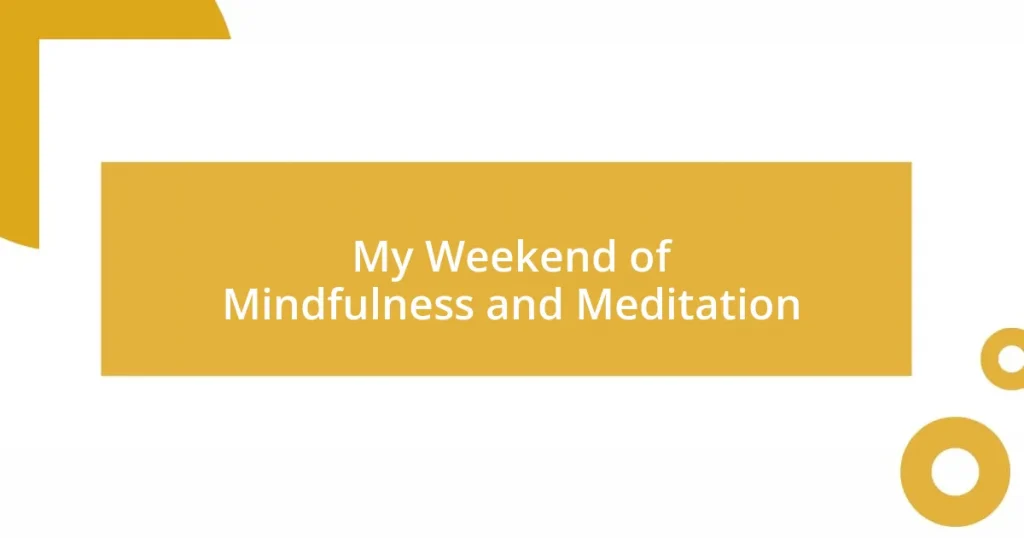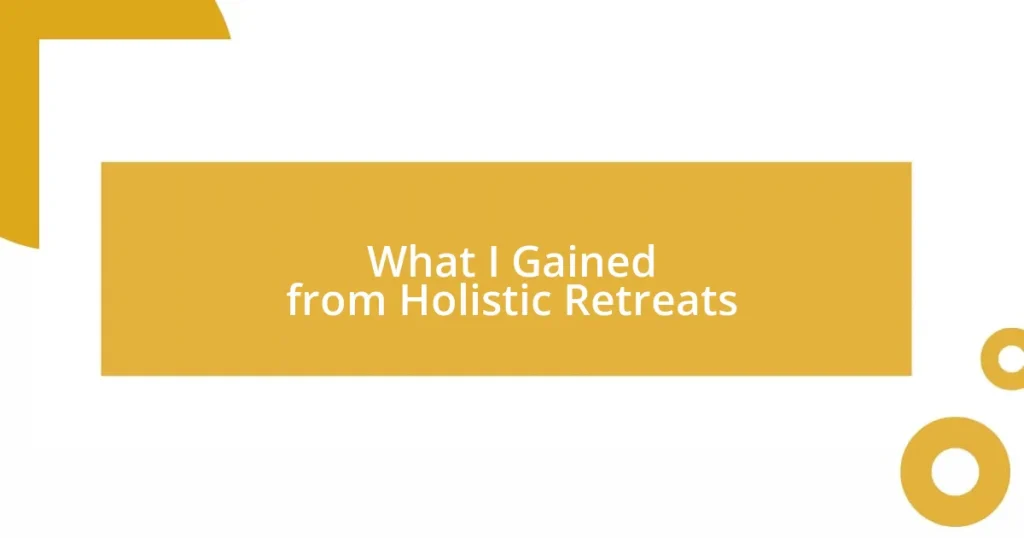Key takeaways:
- Journaling enhances self-reflection by providing emotional distance, clarity of thought, and the ability to recognize patterns.
- Setting a specific time, using prompts, and experimenting with different styles can help establish a consistent journaling practice.
- Transformative experiences in journaling can lead to personal growth, greater self-awareness, and a shift in perspective towards gratitude and fulfillment.
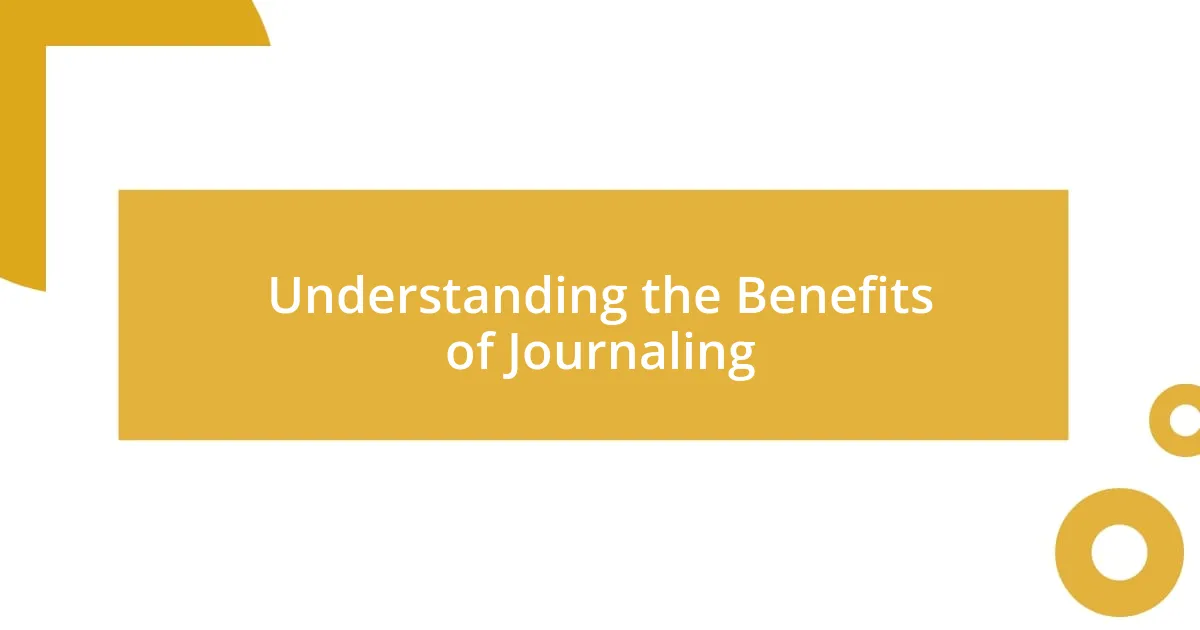
Understanding the Benefits of Journaling
Journaling offers a remarkable space for self-reflection where I’ve often unraveled feelings I didn’t even know I had. One evening, I found myself writing about a stressful day, and as the words poured out, I realized it wasn’t just about the events of the day; it was about my underlying anxieties and fears. How often do we clutter our minds with worries without truly addressing them?
The act of putting pen to paper can transform chaos into clarity. I remember a time when a simple question—“What am I grateful for today?”—turned my perspective around. It was like flipping a switch; suddenly, I could see the silver linings in my struggles. Isn’t it fascinating how gratitude can change our brain chemistry in such a profound way?
One of the most significant benefits I’ve experienced from journaling is improved emotional processing. When I write about my feelings, I observe them from a distance, almost like a curious spectator. Are we not more likely to find solutions when we can see our emotions laid out in front of us, rather than swirling chaotically in our minds?
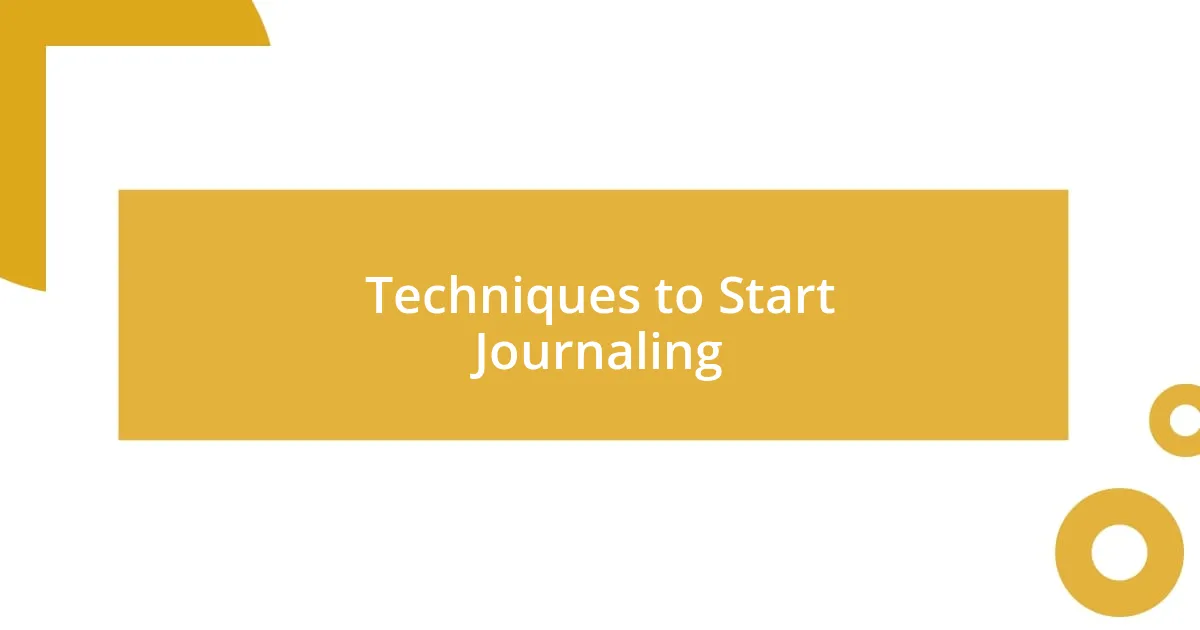
Techniques to Start Journaling
I’ve found that starting a journaling practice can be as simple as setting the right intention. One effective technique is to carve out a specific time each day, even if it’s just ten minutes. Personally, I love early mornings; the world is still quiet, and I can focus on my thoughts without distractions. This routine helps me establish consistency, which is key to reaping the full benefits of journaling. Have you ever noticed how routines can ground us amidst life’s chaos?
Another approach that worked wonders for me was using prompts. Sometimes, the blank page can be daunting, so I turn to specific questions or themes to guide my writing. For instance, I once used the prompt, “What do I wish I could change about my life?” This led me to some profound insights about my desires and aspirations. Prompts can spark deeper reflection and help us explore areas of our lives we might overlook otherwise.
Lastly, I recommend incorporating different styles of journaling based on your mood or needs. There are days when I write freely, while other times, I might doodle or create lists. I recall a day when I decided to illustrate my feelings instead of writing; that shift allowed me to express emotions I couldn’t quite articulate. Mixing it up keeps the practice fresh and exciting—why not try it yourself?
| Technique | Description |
|---|---|
| Set a Time | Designate a specific time each day to write. |
| Use Prompts | Start with guided questions to ease into writing. |
| Mix Styles | Experiment with different journaling styles based on your needs. |
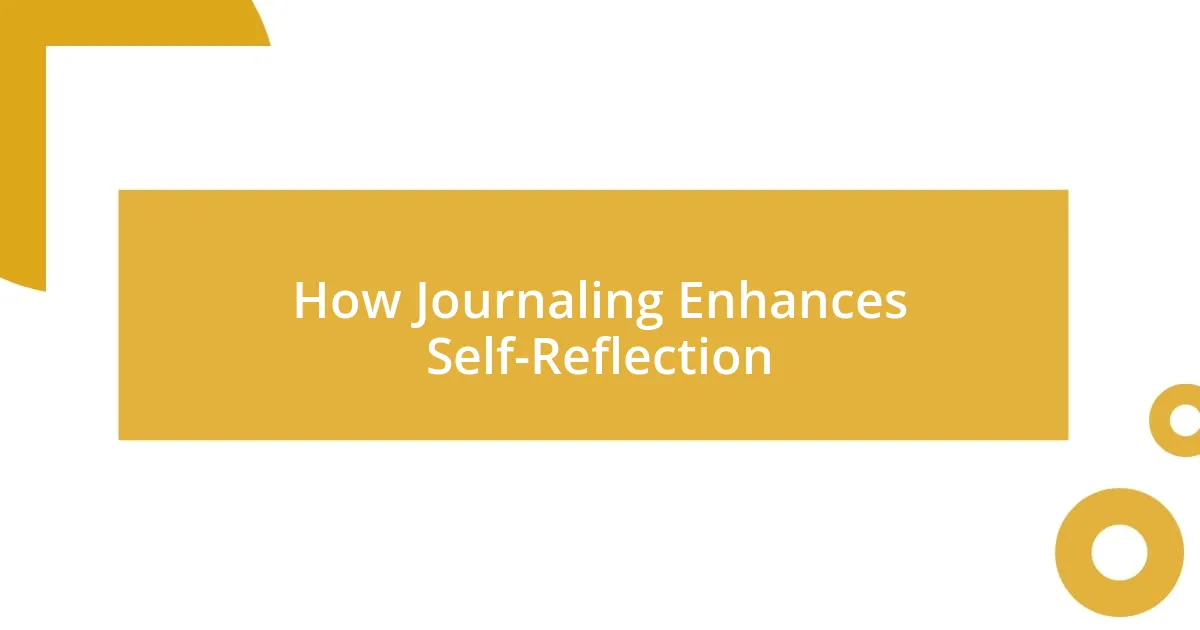
How Journaling Enhances Self-Reflection
When I dive into my journal, it feels like stepping into a vast ocean of thoughts, each wave revealing something new. There was a day after a long week when I sat down and wrote about how overwhelmed I felt. As I poured out those thoughts, I suddenly understood how those feelings tied back to not setting boundaries. It’s like unveiling a hidden layer of myself that I hadn’t acknowledged before.
I’ve learned that journaling can be a crucial tool for self-discovery. Here’s how it enhances self-reflection:
- Clarity of Thought: Writing down my thoughts helps me articulate feelings that might otherwise remain tangled in my mind. I often emerge with clearer insights.
- Emotional Distance: Observing my emotions on paper gives me the space to analyze them thoughtfully instead of being engulfed.
- Pattern Recognition: Through consistent journaling, I’ve noticed recurring themes in my entries. These patterns highlight areas of my life that may need change or attention.
- Goal Setting: Writing about my aspirations has allowed me to set concrete steps toward achieving them, giving my goals a sense of direction.
- Validation: Journaling serves as a reminder that my feelings are valid. When I see my experiences reflected back at me, it becomes easier to accept and process them.
Each time I write, I’m not just recording my day; I’m engaging in a conversation with my inner self, peeling back the layers to reveal who I truly am. This practice has changed how I view my experiences, allowing for deeper connections to myself and my emotions.
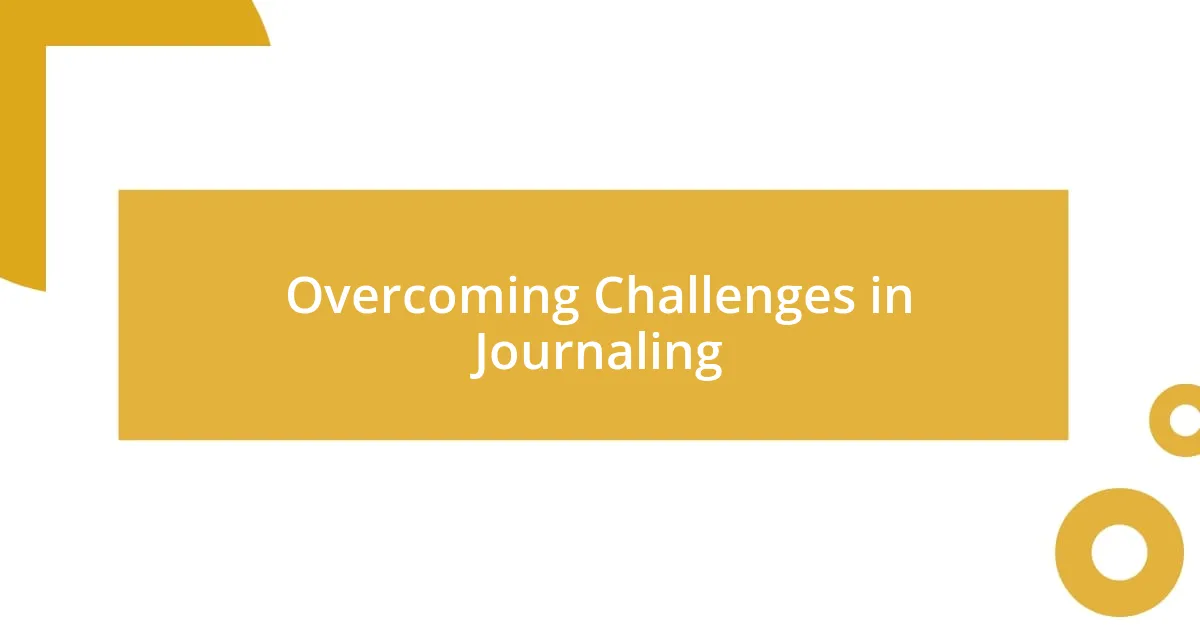
Overcoming Challenges in Journaling
Finding motivation can sometimes be my greatest hurdle when journaling. I recall one evening when I stared at the blank page, feeling uninspired, almost like a block had formed in my mind. In that moment, I turned to music—a song that always resonates with my emotions. As the lyrics washed over me, I felt the urge to capture those feelings in writing. Music helped me unlock my thoughts, reminding me that inspiration can come from unexpected places. Have you tried using your favorite playlist to fuel your writing?
Another challenge I’ve faced is dealing with self-criticism. There are days when I write something that I deem less worthy, and I fight that internal voice telling me it’s not good enough. I’ve learned to remind myself that journaling is not about perfection; it’s about authentic expression. I once filled pages with messy handwriting and unpolished ideas, and as I reread them, I realized they captured my true feelings at that moment. It hit me that vulnerability is where the real magic happens—can you relate to that feeling of letting go of perfection?
Finally, time management has posed a challenge, especially during busy weeks. I remember a particularly hectic month when I let my journaling slip, only to feel the weight of unexpressed thoughts piling up. It made me realize how much I value this practice. Carving even just a few minutes into my day to jot down my thoughts has since become a priority. Even if it’s just a quick note on my phone, staying connected with my journaling practice has helped me navigate life’s ups and downs with a greater sense of clarity. What could you accomplish if you dared to simply write, even for a moment?
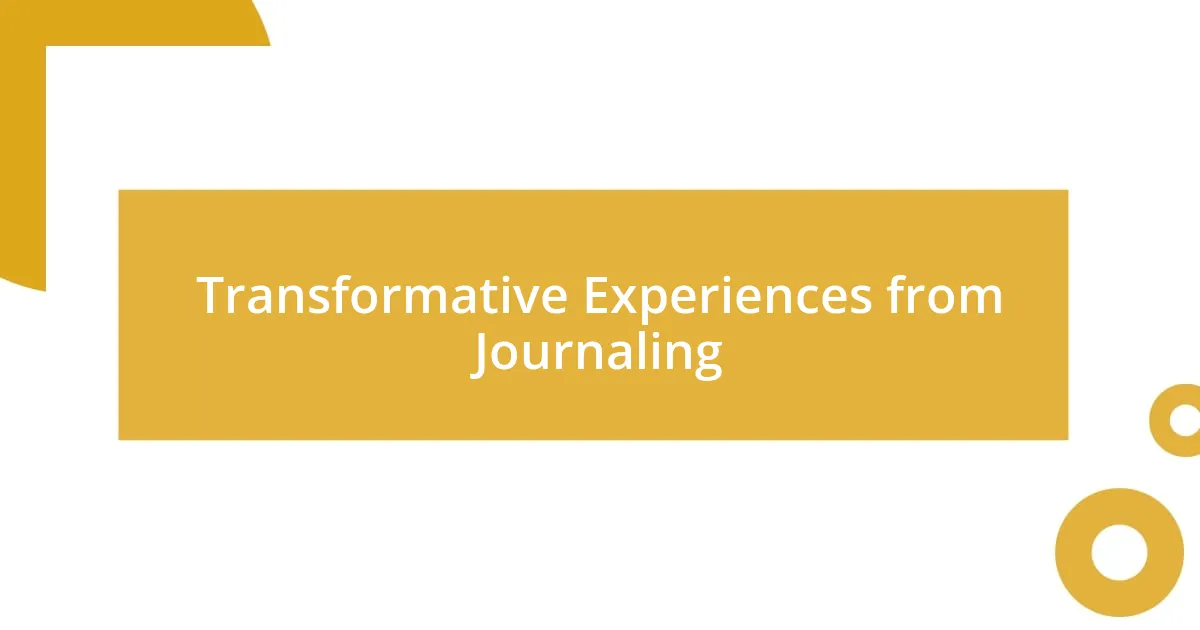
Transformative Experiences from Journaling
There have been moments in my journaling journey that truly reshaped my outlook on life. I vividly remember a cold winter morning when I wrote about my struggles with feeling stuck in my career. As I scribbled down my frustrations, I found myself dissecting each emotion—the confusion, the fear of failure— and, in doing so, recognized the importance of taking small, actionable steps. That profound clarity shifted my entire approach to my professional life.
One of the most surprising transformative experiences was when I wrote a letter to my younger self, reflecting on the dreams I once had and the fears that held me back. As I poured my heart onto the page, I felt an overwhelming rush of empathy for that naive version of myself. There’s something incredibly powerful about acknowledging our past; it made me realize just how far I’ve come and illuminated the resilience I didn’t know I possessed. Have you ever looked back to appreciate your personal growth?
Then, there was that summer night when I decided to list everything that brought me joy—the little things like the smell of fresh coffee or the sound of rain on the roof. As I wrote, I felt a wave of gratitude wash over me, transforming my previously mundane outlook into one filled with wonder. It reminded me that even amidst chaos, there are sparks of happiness to be found. This practice shifted my focus from what I lacked to what I cherished, enriching my perspective dramatically. Isn’t it amazing how a simple act like journaling can reveal so much about ourselves?
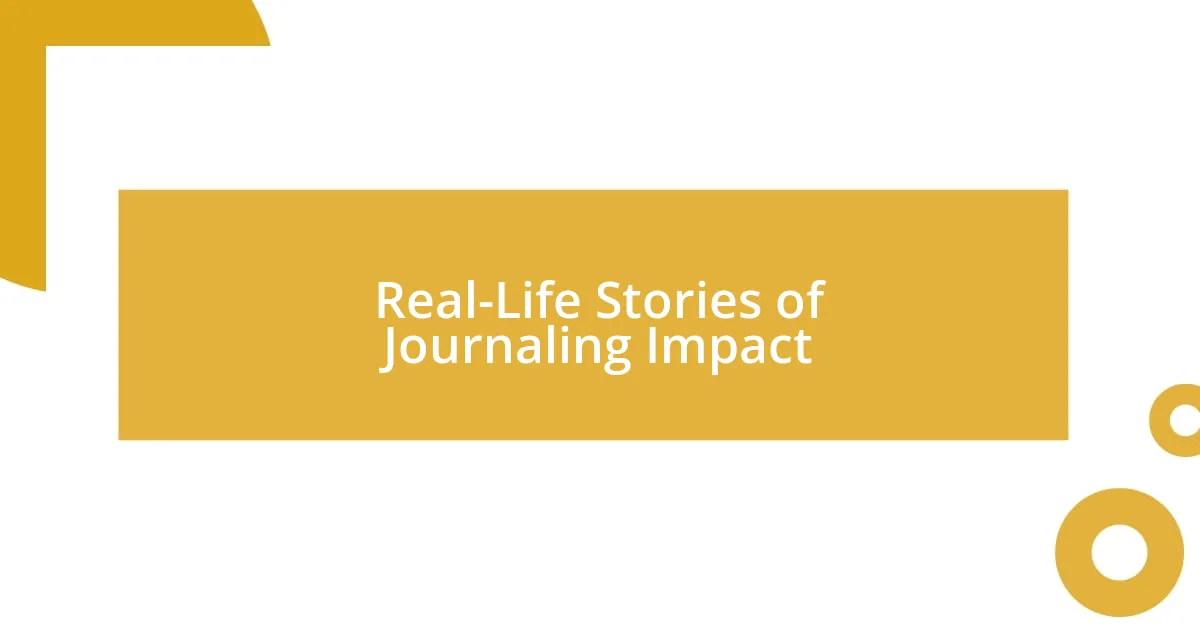
Real-Life Stories of Journaling Impact
It’s incredible how journaling can pivot your mindset in surprising ways. I once participated in a gratitude challenge, where I committed to writing three things I appreciated each day for a month. Initially, it felt trivial—the same mundane things kept popping up. But as I pressed on, I began to discover deeper reasons behind my gratitude. That shift from surface-level observations to profound reflections opened my eyes to the richness of my everyday life. Have you ever stopped to reflect on what truly makes you happy?
Another significant moment for me came during a time of personal loss. I dedicated a few pages to express my grief and confusion, letting my emotions flow freely. In that raw space of writing, it felt as though I was releasing a weight I hadn’t fully realized I was carrying. I wrote about the memories that haunted me, the regrets I clung to, until I finally found closure through my own words. It’s astonishing how giving voice to our pain can pave the way toward healing—have you ever found solace in writing during tough times?
Lastly, I remember when I decided to document my dreams. Each night, I would jot down both my aspirations and the habitual dreams that played on repeat. The act of recording them made me evaluate my life goals and how often I actually pursued them. Slowly, I realized that many of my dreams were sidelined by the daily grind. This awareness prompted changes, pushing me to take bold steps toward fulfillment. Have you ever thought about how journaling might help clarify your dreams?










